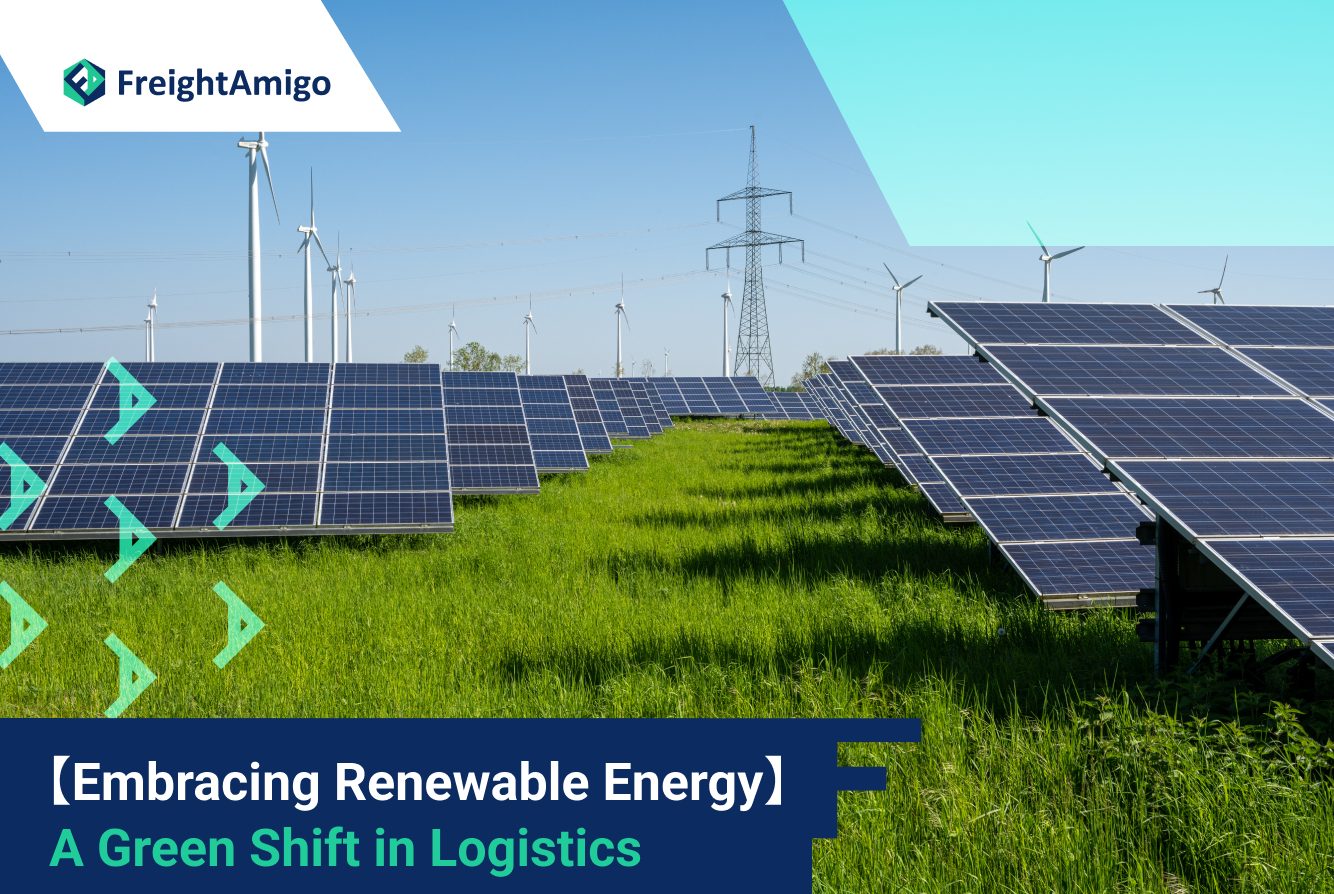Author Name: Tiffany Lee – Marketing Analyst at FreightAmigo
The logistics industry, a critical pillar of the global economy, is undergoing a revolutionary transformation, driven by the adoption of renewable energy sources. As we grapple with the pressing challenges of climate change, renewable energy has emerged as a beacon of hope, offering a path towards sustainable, eco-friendly logistics.
Want To Compare The Best Express, Air Freight, Sea Freight, Rail Freight & Trucking Rates So As To Have Better Control On Cost?
The Green Awakening in Logistics
Logistics, traditionally an energy-intensive sector, has been grappling with an increasing demand for sustainability. This demand has been catalyzed by a combination of factors:
- Environmental Awareness: The escalating threats of climate change and environmental degradation have triggered an urgent need for sustainable alternatives. The logistics sector is actively seeking energy sources that can reduce its carbon footprint.
- Advancements in Technology: The progression of renewable energy technologies has made these sources more accessible, efficient, and cost-effective.
- Government Incentives: Many jurisdictions around the globe are offering incentives to encourage the adoption of renewable energy, such as tax credits, grants, and rebates.
The Power of Renewable Energy
Renewable energy, derived from inexhaustible sources such as the sun, wind, and water, offers several significant advantages:
- Zero Emissions: Unlike fossil fuels, renewable energy sources do not emit harmful greenhouse gases, making them a clean and eco-friendly option.
- Cost-Effective: Over time, renewable energy can result in significant cost savings, due to reduced fuel costs and lower maintenance requirements.
- Energy Independence: Harnessing renewable energy allows logistics companies to generate their own power, thereby reducing reliance on the grid and ensuring a reliable energy supply.
The Integration of Renewable Energy in Logistics
The logistics sector is increasingly leveraging renewable energy in numerous ways, transforming its operations and paving the way for a greener future.
Solar Energy in Logistics
Solar energy, harnessed through photovoltaic cells, is a potent ally in the pursuit of sustainable logistics. Its applications in the logistics sector are manifold:
- Solar-Powered Warehouses: Warehouses, pivotal in logistics operations, consume significant energy. Integrating solar power into these facilities can lead to energy independence, cost savings, and reduced carbon emissions.
- Solar-Powered Electric Vehicles (EVs): The logistics industry is increasingly turning to EVs for transportation. These vehicles can be powered by solar energy, thereby reducing reliance on fossil fuels and minimizing carbon emissions.
- Solar-Powered Charging Stations: As the use of EVs expands, the need for efficient charging infrastructure becomes critical. Solar-powered charging stations can provide a clean, renewable energy source for these stations.
Wind Energy in Logistics
Wind energy, harnessed through turbines, is another renewable source being integrated into logistics. This form of renewable energy can power logistics centers and warehouses, thereby reducing their reliance on the grid and leading to significant cost savings.
Hydrogen Power in Logistics
Hydrogen, when produced from renewable energy sources, is a promising alternative to fossil fuels. It can be used as a fuel for vehicles, offering a clean and efficient method of transportation. Moreover, hydrogen can be stored and transported, making it a versatile energy vector.
A Sustainable Future for Logistics
The integration of renewable energy into logistics operations is not just a trend, but a necessity for a sustainable future. As we continue to innovate and explore new ways of harnessing these renewable sources, we can expect to see a logistics sector that is not only more efficient and cost-effective, but also more environmentally friendly.
The Role of Policy and Regulation
Government policies and regulations play a pivotal role in promoting the adoption of renewable energy in logistics. Policies such as renewable portfolio standards (RPS), feed-in tariffs (FIT), and tax incentives have been instrumental in this regard. These measures not only provide a supportive framework for the growth of renewable energy but also send a clear signal to the market about the government’s commitment to sustainability.
The Business Case for Renewable Energy in Logistics
Adopting renewable energy is not just about environmental stewardship; it also makes good business sense. Here are a few reasons why:
- Cost Savings: As mentioned earlier, renewable energy can lead to significant cost savings in the long run, primarily due to reduced fuel costs and lower maintenance requirements.
- Risk Mitigation: By reducing dependence on fossil fuels, logistics companies can insulate themselves from the volatility of fuel prices and regulatory changes.
- Brand Enhancement: Embracing renewable energy can enhance a company’s brand image, signaling their commitment to sustainability and resonating with eco-conscious consumers.
The Road Ahead
The journey towards a sustainable logistics sector powered by renewable energy is a long one, filled with challenges and opportunities. To accelerate this transition, we need continued innovation in renewable energy technologies, supportive government policies, and a concerted effort from all stakeholders.
The future of logistics is green and powered by renewable energy. It’s time to embrace this change and propel ourselves towards a sustainable and eco-friendly future.
Conclusion
The integration of renewable energy in logistics is a significant stride towards a sustainable future. It offers a win-win scenario, providing environmental benefits while also yielding cost savings and enhancing brand reputation. As we forge ahead, we can look forward to a logistics sector that is not only efficient and cost-effective, but also environmentally friendly and sustainable.
There Are Different Options For Cargo Transportation. If You Want To Choose The Most Convenient And Suitable Solution, It Is Best To Have The Full Support Of Logistics Experts! If You Are Planning To Ship Goods Overseas, Please Go To The FreightAmigo Page For Inquiries.
===
Read More:
【Export of USA】 A Gateway to Success and Global Economic Influence
The Key Trade Partners of the USA: Boosting International Commerce
【Export of USA】 US-China Trade War’s Influence on USA’s Export Industry
===
If you have any inquiries on logistics/supply chain, feel free to contact FreightAmigo now:
Chat with us online OR
Phone : +852 28121686
WhatsApp: +852 27467829









































